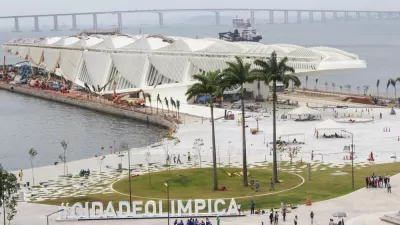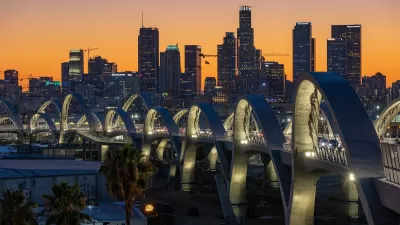In the quadrennial competition to secure mega-events such as the Olympics and political conventions, the economic benefit to host cities is regularly flaunted. Carl Bialik looks at why big events may not mean big bucks for their host cities.
London can certainly brag about hosting a well run and memorable Olympics this summer, but according to several economic observers interviewed by Bialik, claims to "a long-term economic boost of anywhere from $20 billion to $26 billion for the U.K." are quite dubious. Ditto for the host committees for the Democratic and Republican conventions to be held this summer who are
expecting "Charlotte, N.C., and Tampa, Fla., each to benefit to the tune
of between $150 million and $200 million this year."
"Playing the role of party poopers are several economic observers who
have gone back to study tax receipts and other signs of extra activity
from earlier, similar mega-events, and generally haven't found much to
crow over," writes Bialik.
Predicting economic impacts is a notoriously inexact science, so projections should be given a measure of leeway. However looking backwards, notes Bialik, one study conducted by Robert A. Baade, an economist at Lake Forest College in Illinois, and colleagues, "agrees that these gains rarely
show up."
"The researchers studied 18 national political conventions
between 1972 and 2004, and found no statistically significant impact on
personal income or local employment when comparing host cities with
control cities that didn't host events."
FULL STORY: Why Mega-Events May Not Mean Mega-Bucks

Planetizen Federal Action Tracker
A weekly monitor of how Trump’s orders and actions are impacting planners and planning in America.

Restaurant Patios Were a Pandemic Win — Why Were They so Hard to Keep?
Social distancing requirements and changes in travel patterns prompted cities to pilot new uses for street and sidewalk space. Then it got complicated.

Map: Where Senate Republicans Want to Sell Your Public Lands
For public land advocates, the Senate Republicans’ proposal to sell millions of acres of public land in the West is “the biggest fight of their careers.”

Maui's Vacation Rental Debate Turns Ugly
Verbal attacks, misinformation campaigns and fistfights plague a high-stakes debate to convert thousands of vacation rentals into long-term housing.

San Francisco Suspends Traffic Calming Amidst Record Deaths
Citing “a challenging fiscal landscape,” the city will cease the program on the heels of 42 traffic deaths, including 24 pedestrians.

California Homeless Arrests, Citations Spike After Ruling
An investigation reveals that anti-homeless actions increased up to 500% after Grants Pass v. Johnson — even in cities claiming no policy change.
Urban Design for Planners 1: Software Tools
This six-course series explores essential urban design concepts using open source software and equips planners with the tools they need to participate fully in the urban design process.
Planning for Universal Design
Learn the tools for implementing Universal Design in planning regulations.
Heyer Gruel & Associates PA
JM Goldson LLC
Custer County Colorado
City of Camden Redevelopment Agency
City of Astoria
Transportation Research & Education Center (TREC) at Portland State University
Camden Redevelopment Agency
City of Claremont
Municipality of Princeton (NJ)





























